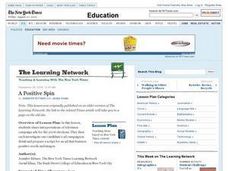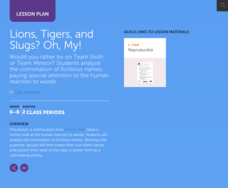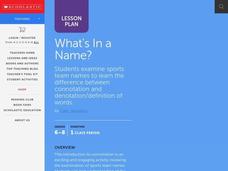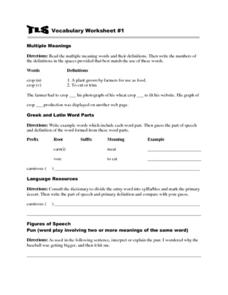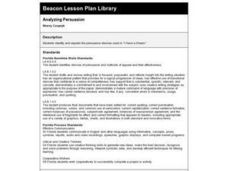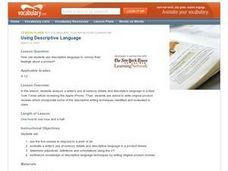Prestwick House
Connotative vs. Denotative Meanings
Besides the dictionary definition, words also carry the added weight of meanings that are inferred or implied, meanings conferred on words, or connotations. To gain an understanding the importance of connotation, class members engage in...
Curated OER
Express Yourself Lesson Seed 2
Use Langston Hughes's poem, "Words Like Freedom," to explore the concepts of freedom and liberty. Learners read the poem, determine the theme, and use the provided graphic organizer to examine the connotative and denotative meanings of...
Curated OER
Connotation and Denotation: How Word Choice Affects a Paragraph
Review the terms denotation, connotation, diction, and mood in paragraph writing. After defining the terms, middle schoolers practice writing examples of both connotation and denotation. They complete a connotation and denotation graphic...
Media Smarts
Bias in News Sources
As young consumers of media, it is important for high schoolers to explore concepts of bias and prejudice, and how they may be present in media. After discussing ideological messages that media can contain, individuals complete a warm-up...
Curated OER
A Positive Spin
Study word choice and connotation in advertising. Readers examine campaign ads, both negative and positive, from the 2006 mid-term election before discussing an article and analyze a campaign of any candidate they choose. Finally, they...
Scholastic
Lions, Tigers, and Slugs? Oh, My!
Explore the power of words with your class by analyzing the connotations of fictitious sports team names. Learners discuss team names and the mental images they convey. They create logos to illustrate the meanings and connotations of...
Curated OER
What's In a Name?
Introduce your language arts class to connotation, denotation, and diction. Middle schoolers identify and differentiate between the connotative and denotative meanings of words by analyzing the fictitious sports team names. Learners...
Curated OER
Speak Write! Understanding the Hidden Meaning of Words
"Can the connotation of a word or phrase create bias or prejudice?" The activities in this SMART Board lesson plan are directed toward this question, which will be sure to incite lots of opinions and ideas. The SMART Board file guides...
EngageNY
Launching the Performance Task
This word or that, this picture or that. Individuals dive into the lives of The Little Rock Nine and the connotation used in the book A Mighty Long Way as they begin the performance task. The task scenario establishes literature lovers...
Curated OER
Understanding Connotation
Lincoln's "Gettysburg Address," which is available online, is used in the language lesson presented here. Middle schoolers read through the text for comprehension. Then, they reread the first paragraph and identify all the words with...
Shmoop
ELA.CCSS.ELA-Literacy.L.11-12.5
"Timid, scared, terrified." High school scholars examine words, their denotations and connotations, in a series of exercises that use lines from Shakespeare to explore figurative language and word relationships. Participants then...
Curated OER
"Shooting an Elephant"
Study selected vocabulary terms in George Orwell's "Shooting an Elephant." A chart includes five selections, and learners must record the connotative and denotative meaning for each. A great look at using the context to define vocabulary...
Franklin D. Roosevelt Presidential Library & Museum
Pearl Harbor Activity #2: Why Do Words Matter?
Words matter! That's the big idea behind an activity that asks scholars to replace words in FDR's "Day of Infamy" speech with synonyms. They then listen to a recording of President Roosevelt's address and compare his version to their own.
Pennington Publishing
Vocabulary Worksheet #1 & #2
These two worksheets cover several grammatical topics. Pupils work on words with multiple meanings, Greek and Latin word parts, word connotations, academic language, and more. The result is seven quick exercises that could be used...
Curated OER
Analyzing Persuasion
A reading of Dr. Martin Luther King Jr.'s "I Have a Dream" speech launches a study of rhetorical devices such as hyperbole, allusion, metaphor, simile, personification, connotative language and parallel structure. Class members then...
Curated OER
Using Descriptive Language
Students examine the use of adjectives in a product review, then write their own descriptive review. In this writing and word usage lesson, students first analyze the choice of adjectives in a New York Times article about the iPhone,...
Curated OER
Practice Book O
Whether you need resources for reading comprehension, literary analysis, phonics, vocabulary, or text features, an extensive packet of worksheets is sure to fit your needs. Based on a fifth-grade curriculum but applicable to any level of...
California Federation of Chaparral Poets, Inc
Poetic Devices
Have everything you need to know about the elements of poetry with a nine-page handout. Split into four categories—word sounds, meanings, arrangement, and imagery—budding poets may reference terms, read definitions, descriptions, and...
Overcoming Obstacles
Listening Critically
Eschew obfuscation!! High schoolers learn techniques that permit them to listen critically, sort through verbiage used to hide meaning or mislead listeners, and determine the message's validity.
Curated OER
An Ideal for Which I Am Prepared to Die
English language learners have an opportunity to closely examine the academic language in portions of Nelson Mandela's famous 1964 Court Speech, "An Ideal for Which I Am Prepared to Die," with a lesson that looks at key passages from the...
Texas Education Agency (TEA)
Cognates (English III Reading)
Did you know that "30-40 percent of all words in English have a related word in Spanish?" This fact launches an interactive study of cognates appearing the same in English and Spanish. Learners demonstrate what they have learned about...
Texas Education Agency (TEA)
Reference Guides (English III Reading)
An interactive resource introduces users to dictionaries, glossaries, and thesauri and the significant differences among these reference guides. Users learn which reference is best for which kind of search, examine sample entries from...
Scholastic
Choose Your Words Wisely (Grades 9-12)
Words, words, words. The function of words in persuasive writing is the focus of a group activity that asks members to analyze how words advertisers use are designed to influence targeted audiences.
K12 Reader
Winter Adjectives: Shades of Meaning
Is wet damper than soggy? Young grammarians consider shades of meaning by ranking a set of winter adjectives from the weakest to the strongest.
Other popular searches
- Word Connotations
- Connotations and Denotations
- Connotations of Words
- Denotation and Connotations
- Connotations List
- Poems With Connotations
- Writing Using Connotations
- Rudyard Connotations
- Connotations Worksheets
- Euphemisms and Connotations
- Connotations and Sentences






